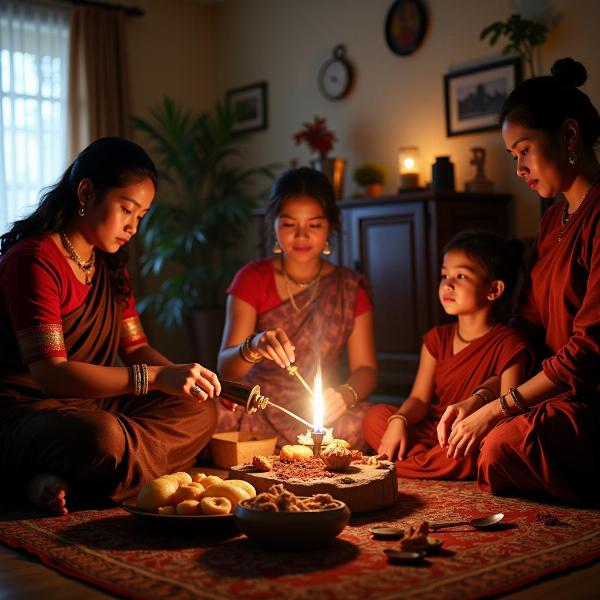Understanding the significance of a death anniversary in Hindi culture is crucial for anyone seeking to navigate the nuances of Indian traditions. The term “death anniversary” itself translates to several phrases in Hindi, each carrying its own weight and cultural implications. This article explores the various terms used to describe a death anniversary in Hindi, delving into their meanings and the customs associated with commemorating the departed. Knowing the correct terminology and customs can demonstrate respect and empathy during a sensitive time.
Common Terms for Death Anniversary in Hindi
Several terms are commonly used to refer to a death anniversary in Hindi. Let’s explore some of the most prevalent ones:
- Barsi (बरसी): This is arguably the most common term used for a death anniversary. It specifically refers to the annual commemoration of the death. Barsi ceremonies often involve religious rituals, prayers, and the sharing of food with family and friends.
- Shraadh (श्राद्ध): This term refers to the Hindu ritual performed annually to honor deceased ancestors. While encompassing the anniversary of death, Shraadh has a broader religious context and is a part of a larger cycle of ancestral veneration. It typically involves offering food and prayers to the departed souls.
- Tithi (तिथि): Tithi refers to the specific lunar day according to the Hindu calendar on which a person passed away. While not strictly synonymous with “death anniversary,” it is crucial for determining when the barsi or shraadh should be performed. Each year, the rituals are performed on the same tithi.
- Punya Tithi (पुण्य तिथि): This term emphasizes the sacredness of the day of remembrance. “Punya” translates to “virtue” or “merit,” highlighting the positive spiritual aspect of commemorating the departed.
 Death Anniversary Rituals in India
Death Anniversary Rituals in India
The Significance of Commemoration
Observing a death anniversary is deeply rooted in Indian culture. It’s a time to remember the departed, reflect on their life, and honor their memory. The ceremonies also serve as a way to seek blessings from the ancestors and ensure their continued spiritual well-being.
-
Honoring the Departed: The primary purpose of a death anniversary is to pay tribute to the deceased loved one. It’s a time for families to come together, share stories, and remember the individual’s contributions to their lives.
-
Spiritual Significance: The rituals performed during a death anniversary hold deep spiritual meaning. They are believed to provide peace to the departed soul and facilitate its journey in the afterlife.
-
Family Unity: Death anniversaries often bring families together, reinforcing bonds and providing comfort during a time of grief and remembrance. It’s a shared experience that strengthens familial connections.
Customs and Rituals
The specific customs and rituals associated with a death anniversary can vary depending on regional traditions and family practices. However, some common practices include:
-
Prayers and Pujas: Religious ceremonies and prayers are often performed by priests or family members. These rituals are intended to invoke blessings for the departed soul.
-
Offering Food: Food is often prepared and offered to the deceased, as well as shared with family, friends, and the needy. This act symbolizes sharing a meal with the departed soul.
-
Visiting Religious Sites: Some families visit temples or other religious sites to offer prayers and seek blessings for the departed.
Why is understanding “Death Anniversary Meaning in Hindi” important?
Understanding the appropriate terminology and customs associated with death anniversaries in Hindi demonstrates respect and sensitivity. It allows you to communicate effectively and participate meaningfully in these important cultural observances.
Conclusion
Knowing the various terms for “death anniversary” in Hindi – barsi, shraadh, tithi, punya tithi – and understanding the associated customs is essential for navigating Indian culture. These commemorations are a significant part of Hindu tradition, serving to honor the departed, offer spiritual comfort, and reinforce family bonds. By understanding the “death anniversary meaning in Hindi,” you can show respect and empathy during a sensitive and culturally significant occasion.
FAQ
-
What is the most common term for death anniversary in Hindi? Barsi is the most commonly used term.
-
What is the difference between barsi and shraadh? While both commemorate the deceased, shraadh specifically refers to the Hindu rituals performed, whereas barsi refers to the anniversary itself.
-
What is tithi? Tithi refers to the specific lunar day according to the Hindu calendar on which the person passed away.
-
Why is it important to understand these terms? Understanding the appropriate terminology demonstrates respect and allows for meaningful participation in these important cultural observances.
-
What are some common customs associated with a death anniversary in Hindi culture? Common customs include prayers, offering food, and visiting religious sites.
Meaning-Hindi.in is your trusted partner for all your Hindi translation needs. We offer a wide range of translation services, from business and legal documents to website localization and educational materials. Our expert team understands the nuances of Hindi language and culture, ensuring accurate and culturally sensitive translations. Need help with translating documents related to life events, legal matters, or technical manuals? Contact us at [email protected] or call us at +91 11-4502-7584. Meaning-Hindi.in – bridging the language gap, connecting cultures.